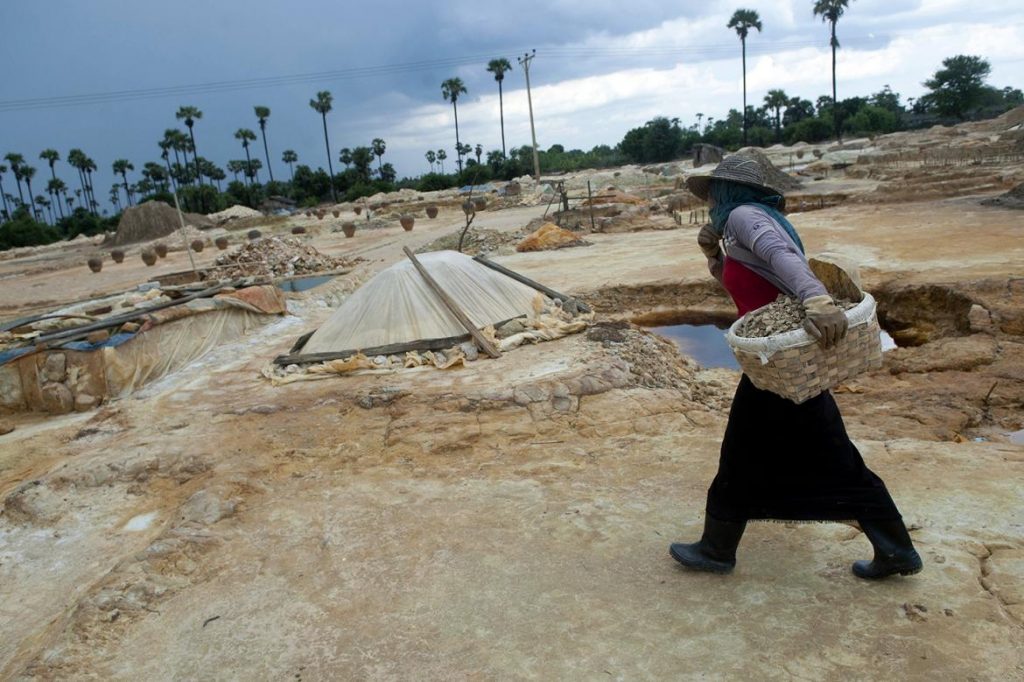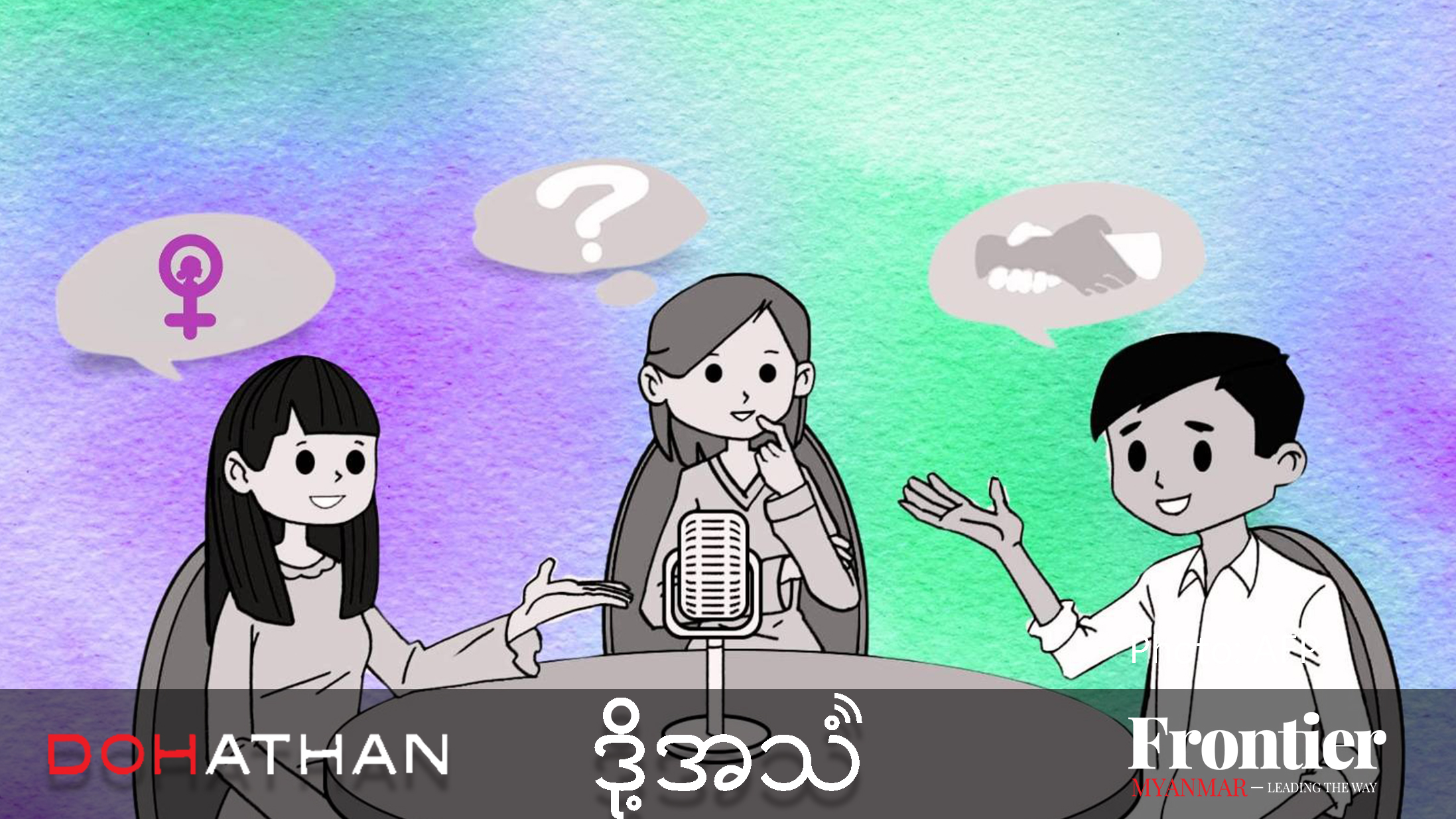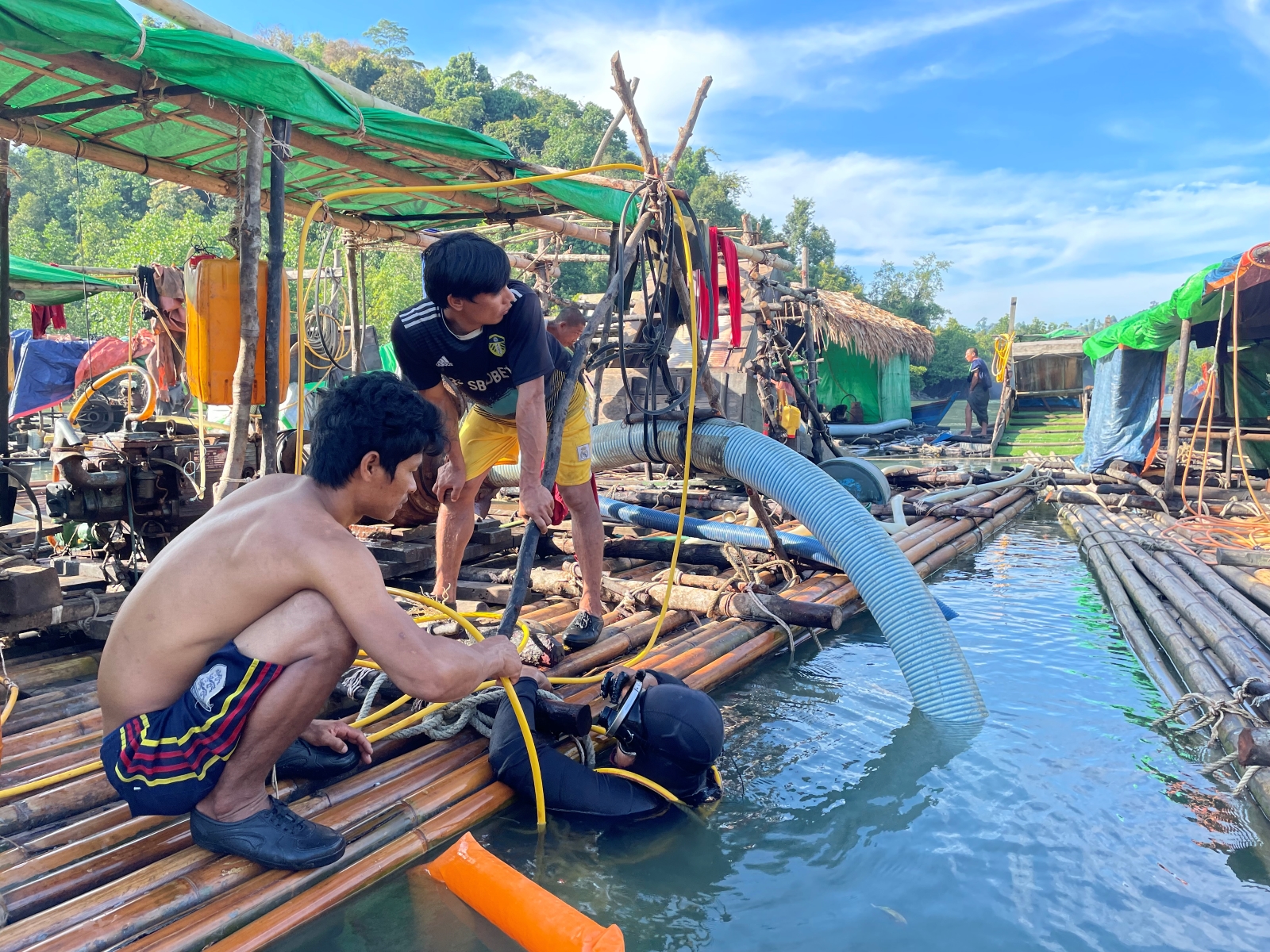A Chinese and Tatmadaw-backed copper mine has left a trail of land disputes and alleged environmental damage, and local farmers fear they may never receive redress.
By OLIVER SLOW, WIN ZAR NI AUNG and EI EI MON | FRONTIER
Daw Yi Yi Win, 43, has lived her whole life in Sete village, close to the western banks of the Chindwin River in Sagaing Region’s Salingyi Township. She remembers when the area surrounding it was nothing but fields that local residents used to grow an assortment of crops.
“We used those fields for generations,” Yi Yi Win told Frontier during a recent visit to her village. “We grew sesame, beans, wheat. It depended on the season.”
Today, however, those farmlands have largely disappeared, replaced by the Letpadaung Copper Mine, the heavily-fortified compound of which looms to the village’s north. As dusk descended over the village, the sound of stones being crushed on the site could be heard in the distance.
Smaller-scale mining work had been conducted at the site for decades, but in 1996 Canadian company Ivanhoe Mines formed a joint venture with the state-owned Mining Enterprise No. 1 to scale up the operations there. In 2011, Wanbao Mining Copper Ltd, a subsidiary of Chinese state-owned arms manufacturer Norinco, formed a partnership with Myanmar’s military-linked Myanmar Economic Holdings Limited to take over operations under the joint venture Myanmar Wanbao.
Support more independent journalism like this. Sign up to be a Frontier member.
The Wanbao project coincided with political reforms that began in 2011, and local residents used the freer environment to stage mass protests. But their right to protest was not respected by the authorities, who branded the demonstrations unlawful because they had not received official permission. The standoff climaxed in November 2012, when police used smoke grenades containing white phosphorus to disperse protesters, causing extensive chemical burns to dozens of people, including monks.
The project was suspended and the government formed an investigation committee led by Daw Aung San Suu Kyi, who was opposition leader at the time as head of the National League for Democracy. The committee’s report acknowledged that an environmental and social assessment had not been conducted, but advised against cancelling the project because it would hurt the economy, as well as relations with China.
Following the report’s release, Wanbao said it would “continue contributing to the sustainable development of our local community and of Myanmar as a whole”, and mining was allowed to resume in May 2016.
In December 2014, local resident Daw Khin Win was shot and killed by police during a protest against an expansion of the mine’s area, leading to protests outside the Chinese embassy in Yangon. No public investigation has been conducted into the killing.
Calls to Myanmar Wanbao’s Yangon office went unanswered, but on its website the company said that it regularly consults with the people of surrounding villages “on all issues concerning our work as part of our ethical approach to mining”.
Local residents and human rights groups insist that this isn’t the case. In a report published in February 2017, Amnesty International said the project was “plagued by human rights abuses”, citing land confiscations, environmental damage and the use of repressive laws to harass activists and villagers opposed to the mine, and called on the Myanmar government to suspend operations.
Yi Yi Win said that residents of Sete and others villages had still not been offered adequate compensation for the land they lost, and that waste overspill from the mine was destroying the fields that remain.
She said that in October 2018, chemicals from mining activity contaminated the land around nearby villages, harming many of the trees and vines that villagers depend on for their livelihoods. “The [betel] leaves changed to the colour of rust, and the stalks turned red and rotted. We see particles on the leaves, and have to pour water to clean them before plucking,” said Daw Htay Htay Win, a resident of Kyauk Phyu Tine village.
Officials from the Ministry of Natural Resources and Environmental Conservation and Myanmar Wanbao visited the village and concluded that the land had been contaminated, but no action has yet been taken, Yi Yi Win said.
Much as she opposes the mine, Yi Yi Win said that she accepts that she cannot stop it, but that she and her fellow villagers wanted to receive fair compensation. Residents in another area affected by the project were offered K19 million per acre, but they were offered only K1.8 million. The villagers also want two jobs for every household affected by the project, compared to the one job per household currently being offered.
She also expressed concern that she and other villagers would be relocated if the project site were to be expanded again. “I believe we won’t move from this village, but we will have to if they put pressure on us, because they are dictators,” she said.
Opposition to the project hasn’t softened in other villages close to the mine. Ko Aung Zaw Oo, a resident of Wet Hmay village on the northeast corner of the site, said he would be happy for the mine to continue operating if it were beneficial to the country, but he had seen little evidence that it was.
Speaking to Frontier at his home, he described the government having taken lands “as they wish” for the project, with a lack of adequate compensation for residents, and an overall lack of transparency.
In early March, State Counsellor Daw Aung San Suu Kyi conducted a town hall meeting in Monywa, which is across the Chindwin River from the Letpadaung mine site. Local residents Frontier met at Wet Hmay said they had hoped to raise their concerns with the state counsellor during her visit, but only one villager, Ma Thway Thway Win, was allowed to ask a question about the mine.
In a video of the meeting that was shared on social media, Thway Thway Win told Aung San Suu Kyi that she had met with Sagaing Region Chief Minister U Myint Naing once about the mine, but that he had said he didn’t know about the issue and had no authority to take action. Aung San Suu Kyi responded that the issues surrounding the mine should be resolved by “negotiation” and she urged Thway Thway Win to submit a letter of complaint to the regional and Union governments.
The exchange became heated when Thway Thway Win asked Aung San Suu Kyi to scold a local politician. The state counsellor responded, “There are many people who need to be scolded.”
Thway Thway Win’s sister Ma Phyu Phyu Win told Frontier in Wet Hmay that she had tried to raise her concerns about the mine several times with government officials, but had been consistently rebuffed. She said she had also hoped to raise with Aung San Suu Kyi a criminal case that was opened against her, her sister and another local resident, Ma San San Hla, following an altercation with police officers in the locality in March 2018. Although the charges, related to causing “grievous hurt” to a “public servant” and “wrongful restraint”, were eventually dropped, Phyu Phyu Win said the case had greatly burdened the local community.
“Although we won, we had to hire a lawyer and also lost money because we couldn’t go to work [during] the trial,” she said. “We are not rich; we live hand to mouth. Who will take responsibility for our losses?”
“We don’t like this project,” Phyu Phyu Win said. “It will not do anything to improve this country.”







